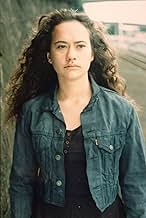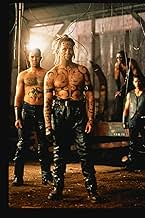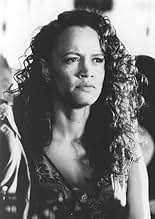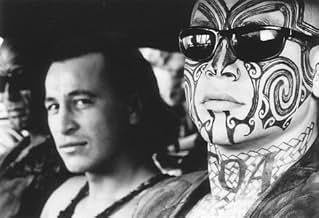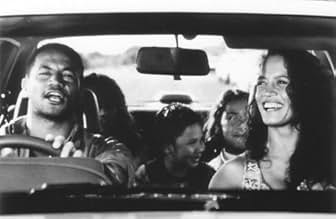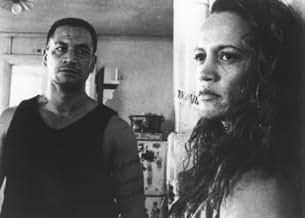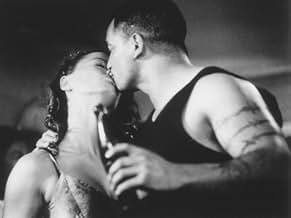CALIFICACIÓN DE IMDb
7.9/10
38 k
TU CALIFICACIÓN
Una familia descendiente de guerreros maoríes se ve atormentada por un padre violento y los problemas sociales de ser tratados como marginados.Una familia descendiente de guerreros maoríes se ve atormentada por un padre violento y los problemas sociales de ser tratados como marginados.Una familia descendiente de guerreros maoríes se ve atormentada por un padre violento y los problemas sociales de ser tratados como marginados.
- Dirección
- Guionistas
- Elenco
- Premios
- 22 premios ganados y 7 nominaciones en total
- Dirección
- Guionistas
- Todo el elenco y el equipo
- Producción, taquilla y más en IMDbPro
Opiniones destacadas
10kiwibeca
I've been reading the comments that people have made on this brilliant piece of film making that makes me proud to be a kiwi. Although I'm not Maori, I have somewhat of an understanding of, and a very deep appreciation for Maori culture. It is after all a major contributor to the uniqueness of New Zealand, and it's what a lot of the tourists come here to see/experience.
Some people have commented that the character of Beth is "descended from Maori royalty" and that the character of Jake is "descended from slaves". That's not quite correct. Although there is a Maori monarch; (Dame Te Atairangikaahu, the current Maori queen lives at the Turangawaewae Marae in Ngaruawahia, her official residence.) the Maori monarchy only goes back to the 19th century, and its not really representative of all Maori as it only really affects Waikato iwi/hapu, (tribe/sub tribe) It is more likely that Beth would be descended from chiefly linage, and hence she and her whanau, (extended family) would be very much aware of and in tune with their whakapapa or ancestry. Beth's line near the end of the movie that her people "once were warriors" is an indicator of this.
(The facial and body tattoos, or Moko that one sometimes sees Maori wearing are in fact representative of their whakapapa. Also, the carvings that feature on Marae and other carved Maori buildings/gates etc are representative of tribal ancestors, much like Indian Totem poles.)
Jake on the other hand is obviously urbanized. He would most probably know little or nothing about his whakapapa, and in addition he probably would not even be able to identify with an iwi or hapu. This would explain why he makes several references to "Maori bulls***". He is disenfranchised from his culture, and probably doesn't even speak Maori that well. (Although Temurera Morrison himself speaks fluent Maori.) His family have obviously been living in Auckland for so long, and there has been such tribal intermingling, that he doesn't know whether he's Arthur or Martha. And what's more, he doesn't care either.
(For those of you who are interested, the motorway shown at the start of the movie is the Southern Motorway which runs right through South Auckland, which is where *a lot* of Maoris and Pacific Islanders live.)
As other people have said, this kind of thing is sadly not unique to Maori, as American/Canadian Indians and Australian Aborigines can testify. Likewise domestic violence itself is not only limited to minority ethnic groups.
This is easily one of the best movies that I have ever seen. So if you haven't had the privilege of seeing it yet, then I highly recommend that you do so. George Henare's stirring Taiaha scene alone is well worth the cost of getting the movie out.
(A Taiaha is a Maori spear. To use one of these, one must have immense mana, or importance. As Henare's character said, the British *feared* the highly skilled Taiaha warriors.)
Some people have commented that the character of Beth is "descended from Maori royalty" and that the character of Jake is "descended from slaves". That's not quite correct. Although there is a Maori monarch; (Dame Te Atairangikaahu, the current Maori queen lives at the Turangawaewae Marae in Ngaruawahia, her official residence.) the Maori monarchy only goes back to the 19th century, and its not really representative of all Maori as it only really affects Waikato iwi/hapu, (tribe/sub tribe) It is more likely that Beth would be descended from chiefly linage, and hence she and her whanau, (extended family) would be very much aware of and in tune with their whakapapa or ancestry. Beth's line near the end of the movie that her people "once were warriors" is an indicator of this.
(The facial and body tattoos, or Moko that one sometimes sees Maori wearing are in fact representative of their whakapapa. Also, the carvings that feature on Marae and other carved Maori buildings/gates etc are representative of tribal ancestors, much like Indian Totem poles.)
Jake on the other hand is obviously urbanized. He would most probably know little or nothing about his whakapapa, and in addition he probably would not even be able to identify with an iwi or hapu. This would explain why he makes several references to "Maori bulls***". He is disenfranchised from his culture, and probably doesn't even speak Maori that well. (Although Temurera Morrison himself speaks fluent Maori.) His family have obviously been living in Auckland for so long, and there has been such tribal intermingling, that he doesn't know whether he's Arthur or Martha. And what's more, he doesn't care either.
(For those of you who are interested, the motorway shown at the start of the movie is the Southern Motorway which runs right through South Auckland, which is where *a lot* of Maoris and Pacific Islanders live.)
As other people have said, this kind of thing is sadly not unique to Maori, as American/Canadian Indians and Australian Aborigines can testify. Likewise domestic violence itself is not only limited to minority ethnic groups.
This is easily one of the best movies that I have ever seen. So if you haven't had the privilege of seeing it yet, then I highly recommend that you do so. George Henare's stirring Taiaha scene alone is well worth the cost of getting the movie out.
(A Taiaha is a Maori spear. To use one of these, one must have immense mana, or importance. As Henare's character said, the British *feared* the highly skilled Taiaha warriors.)
There are films where you can see extensive carnage and it doesn't move you. This is a film where you see a man hit his wife and it hits you in the gut like you're being hit yourself. An excellent depiction of the impact of anger and violence on the members of a poor family. In this case, they happen to be Maoris living in New Zealand. The father dominates the family because he is so powerless in the other facets of his life. He's addicted to boozing and carousing and the only way he can really express himself is with his fists. The wife fights back, but can be beaten into submission. But she's also allowed herself to be seduced by the boozy lifestyle and fears responsibility. The center of the family is the oldest daughter (13), who is really the only one who can communicate with all the other members. The boys are either lost in life or lost in their own rage. The youngest daughter is simply too small and clings to her sister. It takes a tragedy to allow some of these individuals to reach out for each other and try to re-create a form of family life. A very powerful film, not for the faint of heart.
OWW is a truly great film. However I feel that people have missed one of the main ideas of the film. That is the fact domestic violence is truly horrifying. And it doesn't just happen in Maori families, it happens all over the world! I am Maori myself and first saw this film at the theatres with a mostly Maori audience. It was very well recieved. I was surprised to read the commentary by Glamwog when she said all of her Maori friends hate it. Oh and by the way not all Maori are as depicted in the movie!
If you haven't seen this film, do yourself a favour...watch it.
If you haven't seen this film, do yourself a favour...watch it.
This is one of the most powerful and realistic movies I have ever seen.
A true modern-day tragedy, this movie shows the negative aspects of one indigenous culture in today's society. This is a very important movie as it forces you to look at issues that some have to live with on a daily basis.
This movie literally left me feeling sick in the stomach. Particularly with the knowledge that there are families out there living through this. The performance by Temuera Morrison was incredible.
A true modern-day tragedy, this movie shows the negative aspects of one indigenous culture in today's society. This is a very important movie as it forces you to look at issues that some have to live with on a daily basis.
This movie literally left me feeling sick in the stomach. Particularly with the knowledge that there are families out there living through this. The performance by Temuera Morrison was incredible.
10Emunah
I'm too speechless to say anything at length. The movie was... gut wrenching. I don't know if I can even recommend this film to people, because I'm seriously afraid it will give people nightmares for days on end. "Once Were Warriors" is a tough as nails, stomach churning, psychologically scarring and disturbing film about people and things that most are not even aware of exists. The whole cast should be commended for their incredible and brave performances. The person who deserves the most credit is Rena Owen who plays the female lead. Her performance blew me to pieces... she was absolutely superb. I've seen a lot of movies in my life, but never... never anything like this.
¿Sabías que…?
- TriviaTemuera Morrison would get challenged to fight all the time by local thugs after seeing him play Jake Heke.
- ErroresWhen Beth is being beaten by Jake at the start of the film she is thrown into a mirror which shatters completely. Later when the children are cleaning up the mess the mirror is back on the wall with only a few cracks.
- Créditos curiososMost of the opening credits are either split in half, scattered in different areas of the screen, abnormally shaped or used in small white print. Some are even mixed.
- Bandas sonorasOnce Were Warriors (The Awakening)
Performed by Tama Renata
Selecciones populares
Inicia sesión para calificar y agrega a la lista de videos para obtener recomendaciones personalizadas
- How long is Once Were Warriors?Con tecnología de Alexa
Detalles
- Fecha de lanzamiento
- País de origen
- Sitio oficial
- Idiomas
- También se conoce como
- Once Were Warriors
- Locaciones de filmación
- Productoras
- Ver más créditos de la compañía en IMDbPro
Taquilla
- Total en EE. UU. y Canadá
- USD 1,608,570
- Total a nivel mundial
- USD 1,608,610
Contribuir a esta página
Sugiere una edición o agrega el contenido que falta

Principales brechas de datos
What is the Brazilian Portuguese language plot outline for Somos guerreros (1994)?
Responda


